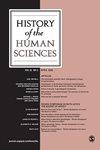谁读雷南
IF 0.8
2区 历史学
Q2 HISTORY & PHILOSOPHY OF SCIENCE
引用次数: 0
摘要
本文称弗吉尼亚-伍尔夫是英国 1880-1937 年间的历史学家。在 1937 年出版的小说《岁月》中,伍尔夫运用欧内斯特-勒南的宗教史和文化史(很可能是他的《耶酥的生活》(Vie de Jésus,1863 年))来创作她自己的历史。通过解读勒南的著作、伍尔夫的阅读和写作,以及勒南对他本人和当代英国读者的意义,我们可以开始思考宗教批判在历史和文学现代性的形成中所扮演的角色。本文章由计算机程序翻译,如有差异,请以英文原文为准。
Who reads Renan
This article claims Virginia Woolf as a historian of the period 1880–1937 in Britain. In her 1937 novel The Years, Woolf employed the religious and cultural history of Ernest Renan, most likely his Vie de Jésus (1863), to produce her own. By unravelling what Renan wrote, what Woolf read and wrote, and what Renan meant, in his own terms and to a contemporary British audience, we can begin to consider the role of religious criticism in the making of historical and literary modernity.
求助全文
通过发布文献求助,成功后即可免费获取论文全文。
去求助
来源期刊

History of the Human Sciences
综合性期刊-科学史与科学哲学
CiteScore
1.60
自引率
11.10%
发文量
31
审稿时长
>12 weeks
期刊介绍:
History of the Human Sciences aims to expand our understanding of the human world through a broad interdisciplinary approach. The journal will bring you critical articles from sociology, psychology, anthropology and politics, and link their interests with those of philosophy, literary criticism, art history, linguistics, psychoanalysis, aesthetics and law.
 求助内容:
求助内容: 应助结果提醒方式:
应助结果提醒方式:


